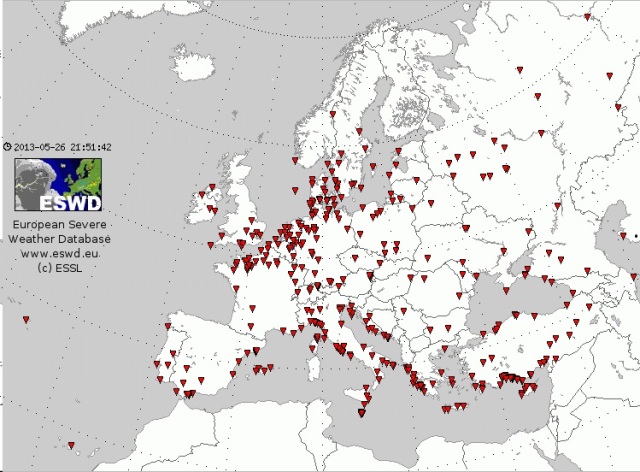Introduction
I was watching Global Public Square on CNN when they presented a trivia question that seemed interesting.
Which nation has the most tornadoes relative to its land area? (a) Britain, (b) Bangladesh, (C) Belgium, (D) United States.
The answer given was (a) Britain. A quick search on the Internet did show a news article Britain having the "highest rate of tornadoes" in the world. The Wikipedia also states that Britain "probably" has the most tornadoes per unit area per year, but it does mention the Netherlands in the same paragraph.
Since I live just north of the top end of "Tornado Alley", I thought I would investigate a bit and see what level of tornado activity that Britain has. While I am at it, I will also look at some other European nations. I do need to comment that while Europe does have quite few tornadoes, they generally are small compared to those in the US. A small tornado is a completely different experience from a large one. I personally have had an EF3 come toward me and pull back into the clouds at the last minute. The sight and sound of a large tornado is something you never forget.
Analysis
Tornado Activity in the US
Since I live in the US, I want to compare international tornado activity to activity in the US. The Weather Channel put together a very nice article on the top 10 states with respect to the number of tornadoes per 10K square miles (mi2). I have put this data into tabular form in Table 1. I have also done the unit conversion from mi2 to square kilometers (km2) to facilitate comparison with European data.
| State Name | Tornadoes per 10K mi2 | Tornadoes per 10K km2 |
|---|---|---|
| Florida | 12.3 | 4.7 |
| Kansas | 11.7 | 4.5 |
| Maryland | 9.9 | 3.8 |
| Illinois | 9.6 | 3.7 |
| Mississippi | 9.2 | 3.6 |
| Iowa | 9.2 | 3.6 |
| Oklahoma | 9.0 | 3.5 |
| South Carolina | 8.9 | 3.4 |
| Alabama | 8.6 | 3.3 |
| Louisiana | 8.5 | 3.3 |
Tornado Activity in Europe
I first went out to the European Severe Weather Database and looked at the reports of tornado activity for 2012. Figure 1 is a graphic of their data -- there were quite a few reports (377 on this image).
Table 2 is a summary of European annual tornado frequency data from this web site. I have added columns for the area of the countries and my calculation for the frequency of tornadoes per square km per year.
| Country | Tornado Count Range | Average Tornado Count | Area (km2) | Tornadoes per km2 per year |
|---|---|---|---|---|
| Netherlands | 20-25 | 22.5 | 41850 | 5.38 |
| Belgium | 5-10 | 7.50 | 30528 | 2.46 |
| United Kingdom | 50 | 50.00 | 242900 | 2.06 |
| Estonia | 8-10 | 9.00 | 45227 | 1.99 |
| Ireland | 10-11 | 10.50 | 70273 | 1.49 |
| Czech Republic | 10 | 10.00 | 78865 | 1.27 |
| United States | 1200 | 1200.00 | 9629091 | 1.25 |
| Hungary | 10-13 | 11.50 | 93028 | 1.24 |
| Germany | 30 | 30.00 | 357114 | 0.84 |
| Greece | 8-10 | 9.00 | 131990 | 0.68 |
| Spain | 30 | 30.00 | 505992 | 0.59 |
| Italy | 12-18 | 15.00 | 301336 | 0.50 |
| France | 10-30 | 20.00 | 640679 | 0.31 |
| Finland | 10 | 10.00 | 338424 | 0.30 |
| European Russia | 8-10 | 9.00 | 3960000 | 0.02 |
Conclusion
I do see that Britain has a higher rate of tornadoes per unit area per year than the US. While Britain does have the most tornadoes per year in Europe, its rate per unit area is not the highest in Europe (at least for the data I found). The relatively low tornado rate per unit area per year of the US makes sense now that I think about it because most of the US only rarely sees tornadoes. Since the US is a big country, the average rate is low. Our Midwestern states do have high tornado rates. However, the Netherlands still beats them all.


It's the strength of tornados rather than their frequency which is more significant. Here in the UK we rarely, if ever, have anything to match the strength of those in Tornado Alley!
I should have made a comment on tornado strength in my text. I could not find good data on (EF info) on European tornadoes, so I did not include any. In the US, we have people that do nothing but study tornadoes and gather statistics. I will add a note to the blog post on how frequency does not mean strong.
Thanks for the comments -- they are always good.
Mathscinotes